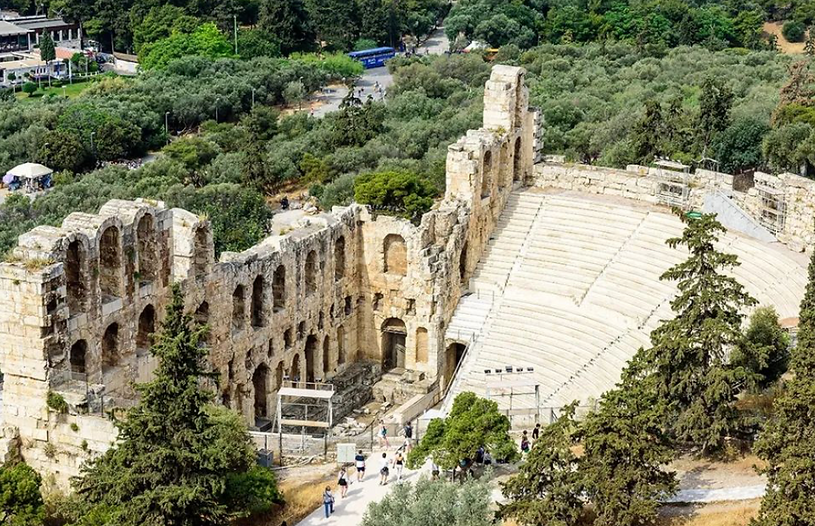
Theater of Dionysus
The Theatre of Dionysus lies on the southern slope of the Acropolis. Not to be confused with its smaller neighbor, the Odeon of Herodes Atticus, the Theatre of Dionysus is not merely a stage. It is the birthplace of Greek drama, whose history stretches back to the 6th century BC.
The Theatre of Dionysus was originally a simple, dirt-packed area dedicated to Dionysus, the god of wine, revelry, and theater. In the early days, during Dionysus' festivals, it was a place for choral songs and dances. The Greek theatre was born in this space; playwrights like Aristophanes brought their comedies to life, filling the air with laughter and sharp wit. As stone seats rose around the stage, the theatre became a lively space for sharing ideas and emotions.
During the 5th century, the Theatre of Dionysus evolved into a dedicated stage for tragedy. Aeschylus, Euripides, and Sophocles explored the complexities of human fate and the wills of the gods through plays like "Oedipus Rex" and "Antigone." These shows offered audiences a chance to confront their place in the world and grapple with profound themes, all intertwined with the celebratory spirit of Dionysus.
Though countless changes have reshaped the Theatre of Dionysus over the centuries, its spirit remains. Even today, the natural setting evokes the energy of the ancient audience. The echoes of Yanni's iconic concert and other modern performances on the Theatre of Dionysus stage remind us of the lasting power of the artistic spirit across generations and continues to inspire.
 |  |  |  |
|---|
Myths about God Dionysus
One of the wildest Greek myths belongs to Dionysus, the god of wine, theater, and all things wild. His story starts with a tragic twist: his mom, Semele, tricked by Zeus' jealous wife, accidentally sees Zeus in his godly form and gets zapped to death. But the cunning Zeus sews the unborn Dionysus into his thigh and keeps him safe until he's born.
Hera's not done yet, though. She sends Titans to tear baby Dionysus apart, scattering his pieces across the land. But Zeus, determined to save his son, gathers the bits and pieces, puts Dionysus back together with his godly magic, and basically makes him extra strong for surviving such a rough start. This earns Dionysus the nickname "the twice-born."
Raised by nature nymphs in a hidden valley, Dionysus learns the secrets of the wild, including how to grow grapes and make wine. As an adult, he travels the world, sharing the gifts of wine and theater, inspiring both crazy parties and deep thinking wherever he goes. His followers, the Maenads, were known for their wild, ecstatic revelries fueled by wine and the god's presence.
Dionysus's myth, with its wild swings from death to rebirth, god powers to human weakness, reflects the complicated nature of the god himself. He's a reminder of the raw power of nature, the healing power of stories and art, and the duality of excess and moderation.